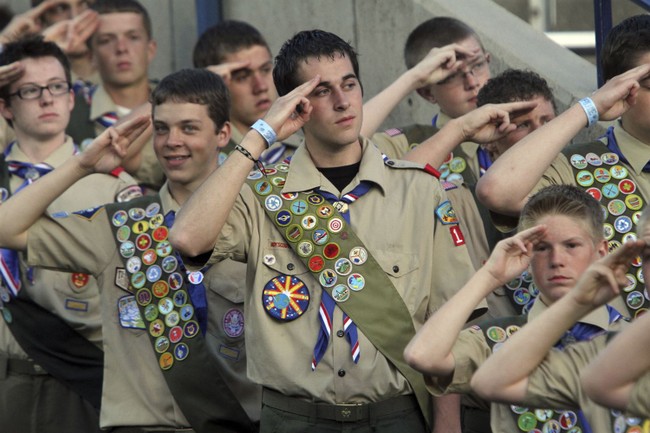On February 8, 2025, the Boy Scouts of America marked its significant milestone of 115 years by undergoing a major rebranding, now calling itself “Scouting America.” This change is much more than a simple name adjustment; it reflects a concerning shift away from the organization’s original principles, bowing to the pressures of modern political correctness and gender ideology. For many, this transition symbolizes a departure from the foundational values that once defined the organization.
The Boy Scouts of America had announced this name change last year, stating, “Though our name will be new, our mission remains unchanged: we are committed to teaching young people to be Prepared. For Life.” This statement aims to assure the public that despite the rebranding, their core mission continues, emphasizing inclusivity and a welcoming environment for all. However, this shift raises questions about the true impact on the organization’s longstanding values.
Historically, the Boy Scouts were synonymous with traditional American values, offering young men a place to learn leadership, survival skills, and discipline. Yet, recent years have seen the organization undergo significant changes, such as allowing openly gay leaders and permitting girls to join its ranks. Each of these decisions has sparked debate about the potential dilution of the organization’s clear mission and stability.
Roger Krone, the president and CEO of the newly named Scouting America, stated, “Scouting America has helped instill timeless values for multiple generations of Americans.” He emphasized the importance of these values in today’s complex world, noting that strong character and effective leadership are more crucial than ever. As the organization celebrates 115 years, it reaffirms its commitment to providing a safe environment for young people to develop essential qualities.
The question arises: Can Scouting retain its core mission amidst such sweeping changes? Activities like camping trips and trail hikes were once celebrated tools for personal growth. However, the shift away from upholding Christian values raises concerns about whether these activities can have the same impact when social dynamics change with co-ed settings.
The organization has faced challenges with declining recruitment, as highlighted by a concerning chart shared on social media. Mark Mitchell from Rasmussen Reports posted, “Pretty sad chart,” reflecting on this downward trend. This decline prompts a critical examination of whether embracing modern ideologies is the solution.
The heart of scouting seems lost amidst the demands for “inclusivity,” leading many to wonder if this change will ultimately be detrimental to the organization. Scouting America claims to prepare young people for life’s ethical and moral decisions, but some argue that these changes compromise that mission. The debate continues as the organization navigates these transformative times.
The impact of such changes on activities once central to scouting’s mission is uncertain. Many question if the essence of scouting can survive in an era of evolving social values. For over a century, the Boy Scouts stood as a symbol of ethical training and character development.
In light of these changes, it’s crucial to consider whether the organization can maintain its identity. The core values that shaped generations seem to be at a crossroads. The future of Scouting America and its commitment to its original mission remains a topic of discussion.
As the organization looks to the future, its dedication to instilling values and skills in young people is reiterated. Yet, the path to achieving this in a rapidly changing world is fraught with challenges. The conversation around the balance between tradition and modernity continues.
While the name change signifies a new era, it also prompts reflection on the past. The Boy Scouts of America once stood firm on its values, guiding young men in their formative years. The question remains whether Scouting America can uphold that legacy.
As Scouting America celebrates its anniversary, it faces the task of navigating these tumultuous times. The organization’s commitment to its mission is clear, but the method of achieving it is under scrutiny. The ongoing debate reflects broader societal changes and their impact on long-standing institutions.
The rebranding aims to create a more inclusive environment, but the implications of this shift are complex. Many supporters of traditional values express concern over the direction of the organization. The discussion around these changes highlights the tension between inclusivity and maintaining core principles.
The future for Scouting America involves balancing its historical values with modern demands. As it adapts to changing societal norms, the challenge is to preserve its essence. The organization’s ability to do so will determine its relevance in the years to come.
In conclusion, the journey of Scouting America is emblematic of broader cultural shifts. The organization’s ability to adapt while staying true to its mission is crucial. The ongoing dialogue about its future reflects the challenges faced by many long-standing institutions today.

1 Comment
BYE! “Shift away from the organization’s original principles.” Absolutely and slowly but surely the dilution and bending to the cultural sickness or sickos of society; “Boy Scouts Cancelled Itself,” like another wimpy gender specific organization that went WOKE! Because in the end those that watch-over the organization and many in the general public “didn’t have the guts to stand up for what is right,” like “Traditional Wholesome American” values and loyalty to one’s ‘foundational beliefs!’
As far as I’m concerned the “Boy Scouts doesn’t exist anymore,” and that organization died, letting the “freaks” once again get their way ‘who will end up in hell and drag anyone they can with them!’ BYE!